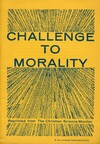

Are you sure?
This bookmark will be removed from all folders and any saved notes will be permanently removed.
Ways that enslave
Originally published in the March 22, 1963 issue of The Christian Science Monitor
The English writer, Laurence Sterne, said of slavery: "Disguise thyself as thou wilt. . . still thou art a bitter draught." And Shakespeare gave his opinion of the person who could not hold, himself free from ways that enslave, when he had Hamlet declare: "Give me that man That is not passion's slave. . . ."
Ever since mankind has been able to make intelligent choice between good and evil, its wisest and noblest thinkers have agreed that immorality is indeed bitterest slavery, while morality is freedom of the highest sort. All religion with any spiritual content, all civilization characterized by progress and stability, all culture which enriches, ennobles, and truly satisfies man's deepest yearnings, are moral in outlook, practice, and profession. Religions, civilizations, and cultures, which are not so, have been throughout history and are today possessed of a fatal weakness which in the end destroys them.
One of the great unsettled arguments of today is whether the civilization of the modern world, and particularly that common civilization which embraces Western Europe and the New World, deserves to be called "immoral." To those who long to see mankind free itself more swiftly from the shackles of enthralling vices, our day seems immoral indeed. To others, who rejoice in the extent to which the world is learning to curb "man's inhumanity to man," today is a time of great moral progress.
Enjoy 1 free Sentinel article or audio program each month, including content from 1898 to today.
JSH Collections
This article is included in:
1963 - PAMPHLET
Challenge to morality
JSH-Online has hundreds of pamphlets, anthologies, and special editions for you to discover.


